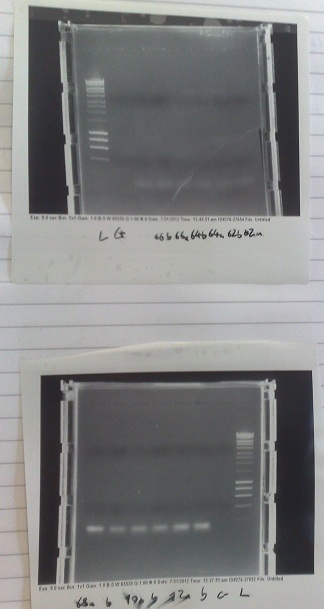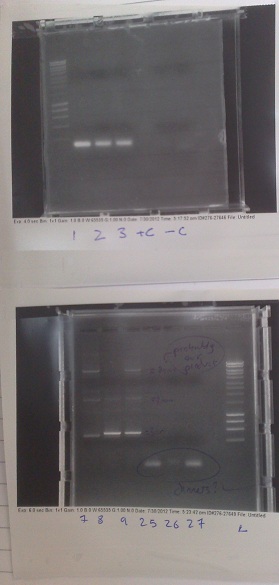Team:Cambridge/Lab book/Week 6
From 2012.igem.org
(Difference between revisions)
(→Monday) |
(→Monday) |
||
| Line 15: | Line 15: | ||
---- | ---- | ||
| + | |||
| + | [[File:mOrangegel.jpg|250px|thumb|mOrange PCR run at multiple temperatures, every two lanes increacing the temperature of the annealing step by 2 °C. No lanes worked.]] | ||
[[File:vectorgel1.jpg|250px|thumb|Top: Fusion, lux containing vector gel. Lanes 2-4, Vector DNA. Lane 5, +ve control. Lane 6, -ve control. Bottom: Vector gel. Lanes 1-3, Fluorescent contruct vector DNA. Lanes 4-6, Riboswitch construct vector DNA.]] | [[File:vectorgel1.jpg|250px|thumb|Top: Fusion, lux containing vector gel. Lanes 2-4, Vector DNA. Lane 5, +ve control. Lane 6, -ve control. Bottom: Vector gel. Lanes 1-3, Fluorescent contruct vector DNA. Lanes 4-6, Riboswitch construct vector DNA.]] | ||
Revision as of 17:42, 3 August 2012
| Week: | 3 | 4 | 5 | 6 | 7 |
|---|
Contents |
Monday
- Not all products were obtained during Friday's PCR. Most of these missing products were large vector backbones. They are being run again, with a much longer extension time of 300s. If that fails, primers will be ordered to split the vectors into manageable chunks, and the PCR reattempted when they arrive.
- PCR cycle x35:
- 15s Denaturing at 95 C
- 45s Annealing at 60 C
- 300s Extension at 72 C
- Remaining stray product had a slightly tricky secondary structure at the 3' end. It will be run at a series of annealing temperatures in a PCR machine capable of a temperature gradient.
- mOrange PCR run at many different temperatures, from 62 °C to 76 °C. Hopefully this should resolve the difficulties we have been having.
Separation of vector and mOrange DNA
- Positive control produced no band. No primer smear - primers may not be in mix for some reason.
- Realized correct lux vector template was not added during PCR preparation, consequently no amplification occured. Still appears to be a primer smear.
- Fluorescent construct produced several bands. Appears to be due to mis-priming during PCR. Either changing the primers or raising the annealing temperature should solve this problem, but may mean that we have to do this PCR separately.
- Riboswitch vector also failed. However, the extraction from the previous PCR run may have worked. We will try producing a functional plasmid with this extraction before running this PCR again.
Construction of riboswitch plasmid with Gibson Assembly
- DNA from lanes 27+28, 27+29, 27+30 from gels run on Friday fused together with Gibson assembly to produce riboswitch construct. This does not have replacement of the first 8 codons of lac I with the 8 codons native to the gene downstream of the riboswitch.
- DNA from lanes 22,23 and 24 fused with riboswitch DNA produced two weeks ago to produce riboswitch construct. This has replacement of the first 8 codons of lac I with the 8 codons native to the gene downstream of the riboswitch.
Transformation of Bacillus with riboswitch construct
- Plasmids made by Gibson transformed into bacillus cells made two weeks ago and transformants plated out on 5μg/ml chloramphenicol plates.
Tuesday
New biobricks
- E.coli containing biobricks ordered were plated out on kanomycin plates (50μg/ml).
Transformation of Bacillus with riboswitch construct
- Plasmids made by Gibson transformed into bacillus cells made two weeks ago and transformants plated out on 5μg/ml chloramphenicol plates.
Transformation of E.coli with riboswitch construct
- Plasmids made by Gibson transformed into TOP10 e.coli cells and transformants plated out on 100μg/ml ampicillin plates.
Wednesday
Mg2+ Riboswitch
- Successful colonies produced from transformations two days ago streaked out onto chloramphenicol (5 μg/ml) containing plates.
- Colonies also grown up in 10ml of medium A for use with plate reader later.
- Standard PCR rerun, this time splitting fluorescent vector into two separate sections, one of 3kb and one of 4.5kb.
- New primers used:
- Fragment 1 reverse:
- Fragment 2 forward:
Thursday
Friday
 "
"


